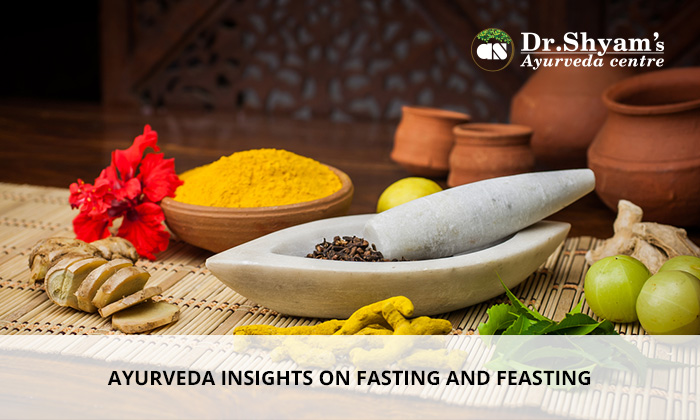
Ayurveda Insights on Fasting and Feasting
During the holy month of Ramadan, Muslims fast from dawn till dusk, abstaining from food and drink. While fasting is a spiritual practice in Islam, it also aligns with some principles of Ayurveda, such as detoxification, purification, and self-discipline.
Fasting in Ayurveda, also known as Upavasa, holds significant therapeutic value and is considered one of the ten langhana therapies. Here are some key points regarding fasting in Ayurveda and its relevance during the holy month of Ramadan:
Daivavyapasraya Chikitsa: Fasting is classified under Daivavyapasraya Chikitsa in Ayurveda, which refers to treatments of a divine or spiritual nature. It is believed that fasting can have profound effects not only on physical health but also on mental and spiritual well-being.
Apatharpana Chikitsa: Fasting is categorized as Apatharpana Chikitsa in Ayurveda, a therapeutic measure aimed at depleting and cleansing the body. By abstaining from food, fasting helps in eliminating accumulated toxins and waste material ( Ama ), thereby promoting detoxification and cleansing.
Benefits of therapeutic fasting –
Lightness and Weight Loss: Fasting imparts a sense of lightness to the body and mind. It helps in reducing the burden on the digestive system, allowing it to rest and rejuvenate. Additionally, fasting can aid in weight loss by promoting the burning of stored fat for energy.
Other effects of fasting –
Decrease in Digestive Power: Extended fasting periods can lead to a temporary decrease in digestive power. This is because the digestive system is not actively engaged in processing food during fasting, which may result in a decline in digestive enzyme production and overall digestive capacity.
Effect on Doshas: Fasting is generally considered beneficial for individuals with Kapha imbalance as it helps in reducing excess Kapha dosha. However, it is contraindicated for those with Vata imbalance, Prolonged fasting can increase the Vata dosha, one of the three doshas (bio-energies) in Ayurveda. Vata imbalance may manifest as symptoms such as dryness, constipation, restlessness, body aches, lack of interest in food, emaciation, delusion, colic ,anxiety etc . It is essential to maintain balance and moderation while fasting to prevent aggravation of Vata.
Depletion of Ojas -Fasting for extended periods can indeed lead to depletion of Ojas in the body according to Ayurveda. Ojas is considered the essence of all Dhatus (tissues) and is vital for maintaining overall health and vitality. Various factors such as fasting, anger, worry, grief, and exertion can cause a decrease in Ojas.
Management of Symptoms -Here are some additional insights on fasting and how to tackle potential issues according to Ayurveda:
.
By following these general guidelines, you can support your body's nutritional needs during fasting while minimizing digestive discomfort and promoting overall well-being.
In summary, while fasting can have therapeutic benefits according to Ayurveda, it's crucial to approach it mindfully and with consideration of individual constitution and imbalances.Paying attention to symptoms that may arise during fasting and adopting appropriate dietary and lifestyle practices can help in optimizing the benefits of fasting while minimizing potential adverse effects. Ayurvedic treatment in Dubai Remember to listen to your body's signals and adjust your diet accordingly to ensure a comfortable fasting experience.
Consulting with an expert Ayurveda practitioner in Dubai can provide personalized guidance and support during fasting and other therapeutic practices to treat the adverse effects.
Dr. Jomol Mariam Thomas
DHA licensed Ayurveda Practitioner
Dr. Shyam’s Ayurveda Centre
Jumeirah
+971 - 56 1151269Karama
+971 - 561144248Al Nahda
+971 - 56 1055691DHCC
+971 - 56 4209554Al Barsha
+971 - 54 5112044Ajman
+971 - 50 6766269